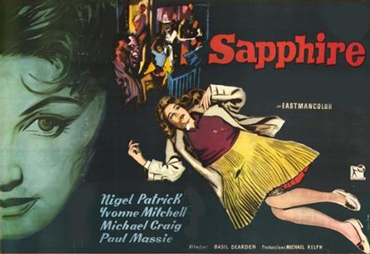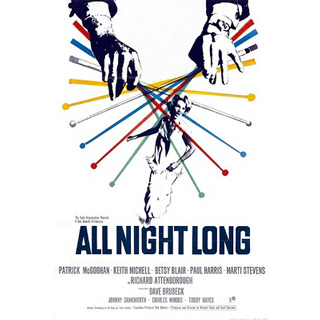
 |
|
|
|
As a new wave of younger British directors began to attract international attention in the late 1950s, many of the Old Guard of "quality English cinema" ceased operations. Director Basil Dearden continued with a few projects similar to his older Ealing pictures, but a string of productions with his producing partner Michael Relph emphasized elements of social comment. As the new decade came in they undertook film projects with strikingly liberal social themes. The 25th entry in Eclipse's disc series is Basil Dearden's London Underground, a grouping of four very different urban crime thrillers, each with a slightly different approach to its subject. 
Filmed in bright Eastmancolor, the popular detective story Sapphire (1959) has much the same visual look as Michael Powell's disastrously disturbing Peeping Tom, released just a few months later. A blonde corpse is dumped in a park in medium close-up, a sight that haunts the rest of the picture. Investigators Nigel Patrick and Michael Craig discover that the pretty victim, Sapphire, was a black college student passing for white. They also suspect that the working class family of her boyfriend (Paul Massie) had something to do with her death, especially when it turns out that Sapphire was pregnant. Harry Waxman's expressive cinematography takes us into areas of London populated with Commonwealth immigrants, new citizens from the West Indies, Africa, and India. Could Sapphire have had another boyfriend with a motivation to kill her? The detectives learn quite a bit about racial attitudes, from the boyfriend's uncooperative family (Bernard Miles and Yvonne Mitchell) and also from a status-conscious black man who rejected Sapphire after she began passing for white. The script by Janet Green (of John Ford's 7 Women) builds human interest as well as suspense, as the police close in on the killer. The movie reflects London's anti-immigrant resentments, but refrains from preaching on the subject. American viewers know star Nigel Patrick best from the Elizabeth Taylor epic Raintree County, and Bernard Miles, one of the main suspects, is even more familiar as one of the villains in Alfred Hitchcock's 1956 The Man Who Knew Too Much. A surprise for genre film fans is provided when young Rank Organization hopefuls John Richardson and the 22 year-old Barbara Steele turn up in bit parts as art students. 
Sapphire was a popular hit, but Dearden and Relph's next picture became an international success. The League of Gentlemen is a somewhat comedic crime caper with rather sober undertones. It did good business upon export to the United States. Discontented ex- army officer Jack Hawkins recruits a number of similarly unhappy ex- soldiers to perform a complicated bank robbery with military precision. The gang includes a gigolo (Bryan Forbes), a confidence man who poses as a vicar (Roger Livesey, a petty crook (Richard Attenborough), a gay masseuse (Kieron Moore) and a fraud who passes for a gentle ladies' man (Nigel Patrick). Hawkins finds them all eager to collect their share of the expected massive haul. To obtain weapons they infiltrate an army training center posing as a General's inspection party, an idea apparently cribbed several years later for the war film The Dirty Dozen. Performed with gas masks and machine guns, the actual raid on the bank is reminiscent of the robbery sequence in Fritz Lang's You Only Live Once. Actor and future director Bryan Forbes also adapted the screenplay from John Boland's thriller, paying close attention to the governing principle established by the classics The Asphalt Jungle and Rififi: it's not the cleverness of the plan that's important, but what the crooks do when unplanned accidents occur. Hawkins' men perform without a hitch -- what could go wrong when they're already celebrating their success? Behind the escapist fun, The League of Gentlemen offer a sour response to the British genre of "how I won the war" movies, that honored the combat exploits of English heroes as a way of brightening spirits during the hard years of economic recovery. Each "gentleman" either has a bad war record or is disillusioned about the military -- Hawkins' leader is incensed that he was pushed back into civilian life when he'd have rather kept serving. Their crime is an opportunity to get even. The film was shot in B&W by Arthur Ibbetson. Showing up in walk-on bits are Nigel Green, Patrick Wymark, Norman Rossington and, as a flamboyant gay, none other than Oliver Reed. Nanette Newman also has a brief scene, as does Basil Dearden's actress wife Melissa Stribling (Horror of Dracula). 
The attitude toward gays in League of Gentlemen doesn't prepare us for Dearden's 1961 film Victim, a superbly crafted drama designed to raise public awareness for homosexuals, who had been outlawed in England since 1885. London's gays were easy targets for blackmailers. With co-writer John McCormick, Janet Green returned to fashion yet another social-issue thriller, this time without a standard genre template as a guide. The film is a courageous effort by all concerned. Barrister Melville Farr (Dirk Bogarde) is stricken with guilt when a young man (Peter McEnery of The Moon-Spinners) commits suicide rather than reveal Farr's identity: the two had been meeting in secret. Despite that fact that he's married and will have to confess to his wife (Sylvia Sims) that his premarital lifestyle has not ended, Farr becomes determined to see the blackmailers brought to justice. He must eventually join forces with the police, who are impressed that the highly regarded Farr will be giving up his career over this problem. Using a helpful contact, Farr searches for other blackmail victims willing to speak up. All are fearful of being outed and going to prison as common criminals, including a pitiful barber (Charles Lloyd Pack) and a trio of closeted upper class gentlemen that includes a famous actor (Dennis Price). A car salesman unable to pay (Nigel Stock) has been giving the blackmailer names of potential new 'customers'. The main issue highlighted by this excellent drama is that the gay population is criminalized for simply being who they are. A sympathetic police detective does make a few position speeches, but Victim gets its message across simply by observing the helpless blackmail victims, who respond in self-destructive ways as the criminals bleed them dry. The film also suggests a strong parallel with the then-ongoing American blacklist. They also were criminalized for exercising their constitutional rights, preyed upon by unscrupulous witch-hunters and in some cases forced to betray their friends and associates. Dirk Bogarde is excellent as an honorable man dealing with identity issues that impact his marriage and his career. To Bogarde's credit, Melville Farr is not portrayed as a faultless crusader. Sylvia Sims' unhappy wife responds to her husband's problem in a sympathetic manner, although we never know if Farr's claim that he was faithful to her after his marriage is completely true. Norman Bird is excellent as a bookseller still in love with a boyfriend that committed suicide. Victim was hailed as a mature film and a convincing argument for the repeal of the unjust law, which indeed was repealed six years later. Michael Koresky's liner notes tell us that the film was denied an MPAA Production Code seal in the United States because Dearden and Relph refused to re-dub the soundtrack to remove the word homosexual. 
If Spanish director Carlos Saura can make a flamenco Carmen, there's no reason why Basil Dearden can't create a jazz- inflected Othello. 1962's All Night Long takes place in a wealthy jazz fan's combo loft apartment/recording studio, and employs the performing talents of famous artists Dave Brubeck, Johnny Dankworth, Tubby Hayes and Charlie Mingus. The screenplay by Nel King and Peter Achilles (a nom de blacklist for writer Paul Jarrico) carefully integrates the music into the familiar story of treachery and murderous jealousy. Dearden's skill at blocking action gets a solid workout as the leading players gather to celebrate the first anniversary party of a beloved (and interracial) couple, band leader Aurelius Rex (Paul Harris) and singer Delia Lane (Marti Stevens). Host and jazz fan Rod Hamilton (Richard Attenborough) is delighted to have so many famous names attending. But the fly in the ointment is drummer Johnny Cousin (Patrick McGoohan). The ambitious Johnny wants Delia as his lead singer to start his own band, and is willing to break up the marriage to get her to return to the stage. Johnny spreads vile rumors among the party guests that Delia is having an affair with the band manager Cass Michaels (Keith Mitchell). He provokes Cass into getting fired and inflames Aurelius with visions of Delia cheating behind his back. He then fakes a voice recording to provide undeniable "proof" of Delia's infidelity. A decade before, producer Bob Roberts had made films by the blacklisted directors Abraham Polonsky and John Berry. With its emphasis on a harmonious creative community spoiled by lies and innuendo, All Night Long plays like a project meant for one of those directors. The Machiavellian Johnny Cousins uses his position of trust to turn collaborators against each other; by the time he's finished, the happily married Aurelius is trying to murder his beloved wife. Johnny has already alienated his melancholy spouse (blacklistee Betsy Blair of Marty). He is so envious of the success of his associates that he'll ruin their lives to get ahead. The all-night party is also a jam session with some of the world's greatest musicians, which makes the film a must see for jazz fans: coverage this good of Dave Brubeck's piano style is hard to find. Dearden's cast is certainly up to the task. Paul Harris convinces as a fair man poisoned by lies; doubt and jealousy cross his face like a dark cloud. The success of the TV show Danger Man brought Patrick McGoohan a series of impressive roles. He played a conflicted prison guard in the same year's The Quare Fellow. McGoohan's skill at expressing intelligent malice keeps All Night Long's intrigues on the side of believability -- Johnny is so mean-spirited, he just might get away with it. After the social-issue content of the previous films, it's refreshing to see a 1962 movie that accepts an inter-racial couple at face value -- Rex and Delia's skin color is never a key factor in the drama. In addition to a score of other noted musicians, the party guests include names-to-be Carol White, Gabriella Licudi and Geoffrey Holder. The four films in Eclipse's DVD set Basil Dearden's London Underground are presented in flawless enhanced transfers. The overcast days and the shiny vintage cars lend the pictures the cumulative effect of a cultural time machine trip to a city where Teddy Boys lurk in cobblestoned alleys and pleasant young mothers harbor fierce prejudices against new immigrants. The sordid nightclubs and run-down neighborhoods of Sapphire seem all the more exotic for being filmed in bright color. All of the films carry English subtitles. Michael Koresky's informative and economical liner notes are the series' only extra. Basil Dearden went on to a few more adventurous projects (like the science fiction drama The Mind Benders) before leveling off with bigger budgeted, less personal work (Khartoum, The Assassination Bureau). Eclipse has once again opened a door to a new corner of overlooked film artistry.
On a scale of Excellent, Good, Fair, and Poor,
Basil Dearden's London Underground rates:
Reviews on the Savant main site have additional credits information and are often updated and annotated with reader input and graphics. Also, don't forget the 2010 Savant Wish List. T'was Ever Thus.
Review Staff | About DVD Talk | Newsletter Subscribe | Join DVD Talk Forum |
| ||||||||||||||||||